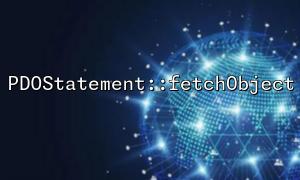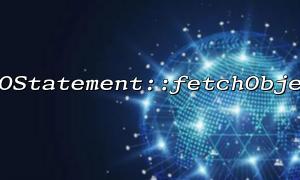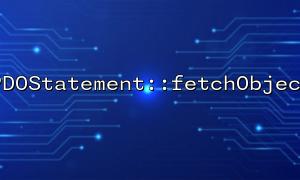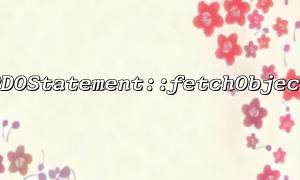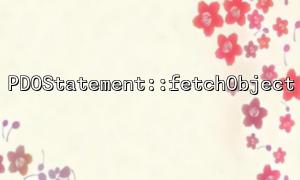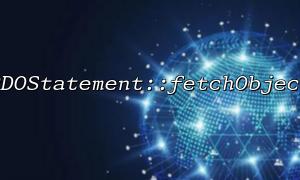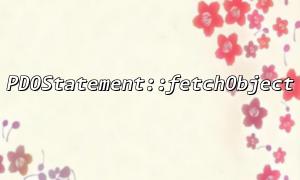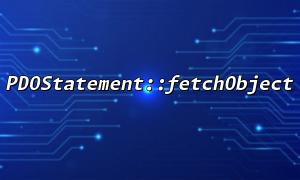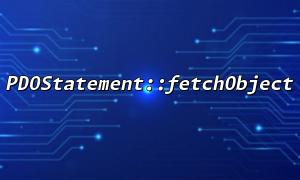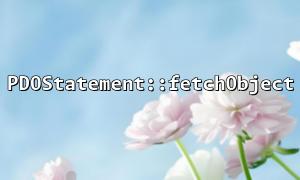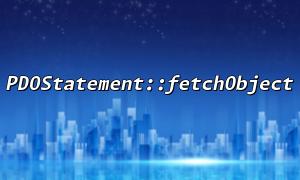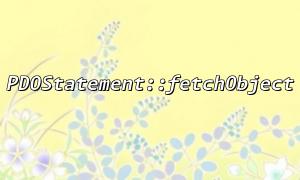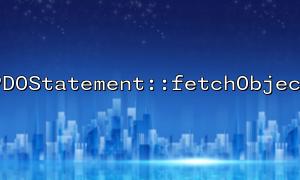When operating databases using PHP, PDO (PHP Data Objects) is a very commonly used database abstraction layer, which provides a unified interface to access different types of databases. In PDO, PDOStatement::fetchObject is a very useful function that converts query results into objects. Through this function, we can not only simplify data operations, but also perform data type conversion to meet actual needs.
The fetchObject function extracts a row of data from the query result set and converts it into an object, returning the object. You can specify the class to be converted to, or have it return a standard object by default ( stdClass ).
$pdoStatement->fetchObject($class_name, $parameters);
$class_name (optional): Specifies the class name to be converted to. If not provided, the default is stdClass .
$parameters (optional): an array of parameters provided to the constructor.
$pdoStatement = $pdo->query('SELECT * FROM users');
$user = $pdoStatement->fetchObject('User');
In the above example, the query result will be converted to an object of the User class.
In some cases, we may need to perform data type conversion on the fields in the query result. For example, convert the timestamp field in the database to a DateTime object, or convert a string to an integer. The fetchObject function provides flexibility, allowing us to implement these transformations through constructors or additional logic.
Suppose we have a posts table containing id , title , and created_at (a field of type timestamp ). We want to convert the created_at field to a DateTime object.
class Post
{
public $id;
public $title;
public $created_at;
// Constructor
public function __construct($id, $title, $created_at)
{
$this->id = $id;
$this->title = $title;
// Will created_at Convert string to DateTime Object
$this->created_at = new DateTime($created_at);
}
}
$pdoStatement = $pdo->query('SELECT id, title, created_at FROM posts');
$post = $pdoStatement->fetchObject('Post');
// Output the converted result
echo $post->created_at->format('Y-m-d H:i:s');
In the constructor of the Post class, we accept the value of the created_at field and convert it to a DateTime object.
In this way, when we get data from the database, the created_at field will automatically become a DateTime object, which can facilitate date operations.
In addition to DateTime type conversion, we can also convert data to other types as needed. For example, convert the price field in the database to a floating number, or convert the stored JSON string to a PHP array.
class Product
{
public $id;
public $name;
public $price;
public function __construct($id, $name, $price)
{
$this->id = $id;
$this->name = $name;
// Will price Convert fields to floating numbers
$this->price = (float) $price;
}
}
$pdoStatement = $pdo->query('SELECT id, name, price FROM products');
$product = $pdoStatement->fetchObject('Product');
// Output the converted result
echo $product->price;
In the constructor of the Product class, we cast the price field to a floating number. In this way, mathematical operations can be performed directly when used.
Performance issues : Each type conversion through the constructor may slightly affect performance, especially when dealing with large amounts of data. The appropriate method should be selected according to the actual situation.
Error handling : Ensure that the field data type is compatible with the target type and avoid type conversion errors. For example, passing a string that cannot be converted to date format to DateTime will result in an error.
Null value processing : If the field value is null , it needs to be judged during conversion to avoid errors.
Through the above techniques, we can make full use of PDOStatement::fetchObject to achieve flexible data type conversion. This not only improves the readability and maintainability of the code, but also makes data processing more efficient and accurate.
Related Tags:
PDOStatement